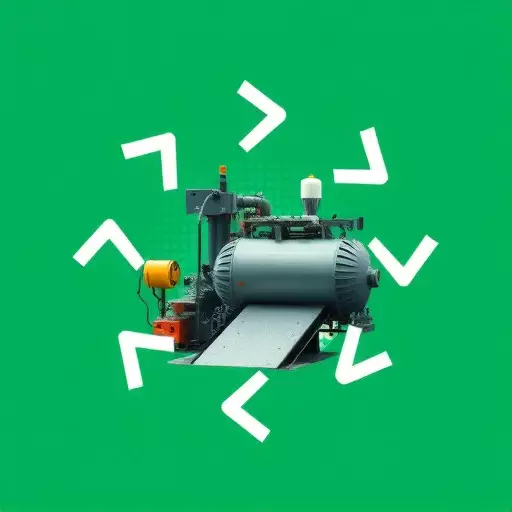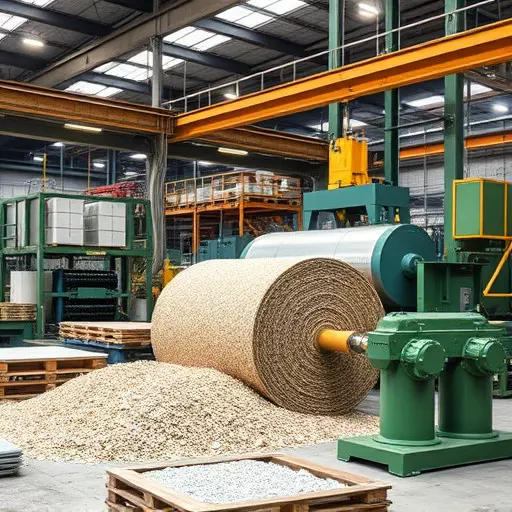Toledo, Ohio, is leading the global shift towards sustainable material processing and eco-friendly manufacturing practices, embracing alternative fuels like biomass, solar energy, biofuels, and hydrogen. This transition drives economic growth while significantly reducing environmental impact, fostering a circular economy, and minimizing carbon emissions. By prioritizing green technologies, Toledo sets an example for urban sustainability worldwide, securing its position as a pioneer in environmentally responsible industrial practices.
The shift towards sustainable material processing is gaining momentum, driven by the need for eco-friendly manufacturing practices. As the world embraces a circular economy, alternative fuels are emerging as key enablers to transform industrial processes and reduce environmental impact. This article explores the rise of alternative fuels in material processing, highlighting their benefits and diverse applications. We also delve into Toledo’s leading role in promoting green material handling, showcasing innovative solutions for a sustainable future.
- Unlocking Sustainable Material Processing: The Rise of Alternative Fuels
- Eco-Friendly Manufacturing: A Shift Towards a Circular Economy
- Benefits and Applications: Transforming Industrial Processes
- Toledo's Role: Leading the Way in Green Material Handling
Unlocking Sustainable Material Processing: The Rise of Alternative Fuels
The pursuit of sustainable material processing has ignited a global shift towards exploring alternative fuels, driving the need for eco-friendly manufacturing practices. Traditional fossil fuels have long dominated the industrial landscape, but mounting environmental concerns necessitate a transition to cleaner and more efficient options. This transformative journey is at the forefront in Toledo, where manufacturers are embracing innovative solutions to reduce their carbon footprint and contribute to a circular economy.
Alternative fuels offer not just an environmental reprieve but also economic benefits. They range from biomass and solar energy to advanced biofuels and hydrogen, each presenting unique advantages in terms of availability, cost-effectiveness, and efficiency gains. By adopting these alternatives, Toledo’s manufacturing sector can unlock a more sustainable future, ensuring that the region remains competitive while prioritizing ecological stewardship.
Eco-Friendly Manufacturing: A Shift Towards a Circular Economy
The concept of eco-friendly manufacturing is gaining traction as a pivotal strategy for the future of sustainable material processing in Toledo and beyond. This approach emphasizes reducing environmental impacts associated with traditional production methods, moving towards a more circular economy model. By adopting eco-friendly practices, manufacturers can minimize waste generation, conserve natural resources, and significantly lower carbon footprints.
The circular economy paradigm encourages resource recovery and recycling, aiming to eliminate waste. In the context of material processing, this means utilizing alternative fuels and efficient technologies to transform raw materials while preserving their value. Such innovative methods not only benefit the environment but also offer long-term economic advantages, ensuring a more resilient and sustainable future for the industry.
Benefits and Applications: Transforming Industrial Processes
The adoption of alternative fuels in material processing offers a promising path toward sustainable industrial practices. By transitioning from traditional fossil fuels to eco-friendly alternatives, manufacturers can significantly reduce their environmental impact and contribute to a circular economy. One of the key benefits lies in the potential for lower greenhouse gas emissions, addressing a critical concern in the fight against climate change. These alternative fuels, derived from renewable sources such as biomass, solar energy, or even waste materials, present an opportunity to transform industrial processes into more sustainable practices.
In terms of applications, these innovative fuels can power various manufacturing processes, including heating, drying, and chemical production. For instance, using biofuels in place of fossil fuels for energy generation in factories can lead to a substantial reduction in carbon emissions. Moreover, implementing these eco-friendly alternatives can foster innovation, drive economic growth, and create new opportunities for businesses committed to green initiatives. The move towards sustainable material processing in Toledo, Ohio, for example, is not just an environmental imperative but also a strategic step towards a more resilient and prosperous future for the region’s manufacturing sector.
Toledo's Role: Leading the Way in Green Material Handling
Toledo, a city known for its rich industrial heritage, is emerging as a leader in promoting sustainable material processing and eco-friendly manufacturing practices. With a strong commitment to environmental stewardship, Toledo has positioned itself at the forefront of the circular economy movement. The city’s initiatives focus on transitioning from traditional fossil fuel-based energy sources to alternative fuels, which not only reduce carbon emissions but also contribute to a more sustainable future.
Through innovative partnerships and strategic investments, Toledo is driving the adoption of renewable energy solutions in material processing industries. Local businesses are embracing green technologies, such as biofuels, hydrogen, and recycled materials, to create a more environmentally conscious manufacturing ecosystem. This shift towards eco-friendly practices ensures that Toledo remains competitive while prioritizing the well-being of the planet, setting an example for other urban centers worldwide.


